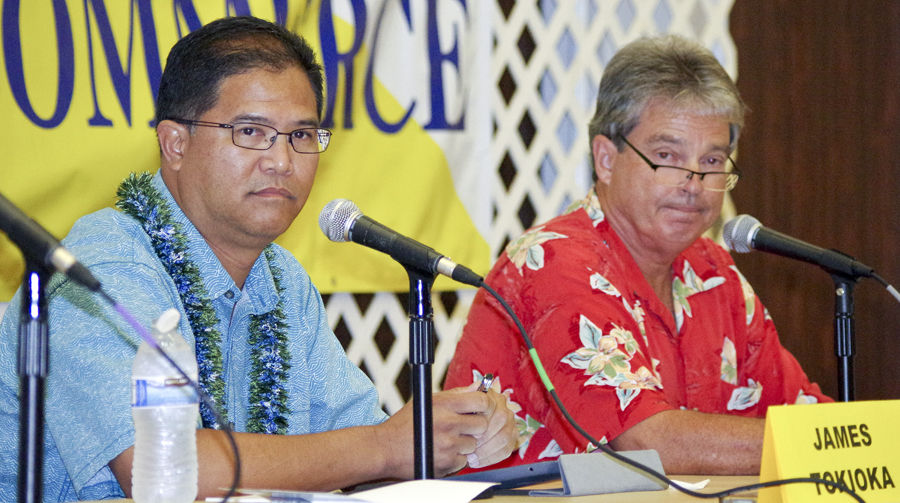LIHUE — The two Democratic and Republican candidates vying for a single state House District 15 seat agreed that the state’s current tax structure should be revamped but were divided on other issues, including marijuana legislation during a political forum
LIHUE — The two Democratic and Republican candidates vying for a single state House District 15 seat agreed that the state’s current tax structure should be revamped but were divided on other issues, including marijuana legislation during a political forum Thursday night in Lihue.
The forum, hosted by the Kauai Filipino Chamber of Commerce at the Kauai Memorial Convention Hall, marked the first time that Democratic incumbent James “Jimmy” Kunane Tokioka and his Republican challenger, Steve Yoder, shared the same stage since the primary election.
Tokioka, who served on the Kauai County Council for 10 years before serving in the state Legislature for four consecutive two-year terms, said he would like to continue recent efforts on a variety of projects, including the resurfacing of Kuhio Highway and the creation of the Kauai Agricultural Good Neighbor program, the state Department of Agriculture’s voluntary guidelines for pesticide use on the island.
Many of these recent efforts, Tokioka said, were forged by collaborative discussions with state and county officials who have served with him over the years.
”I want to continue to use the knowledge and the resources that I’ve gained through this time period to help this county,” Tokioka told the nearly 75 people who attended the political forum.
Yoder, meanwhile, said he wants to reduce the cost of government and alleviate the tax burdens on residents statewide.
”We need to lessen the impact of government — the individual, not government,” Yoder said.
Stance on state tax structure
One of the few times that Tokioka and Yoder found common ground throughout the 23-minute debate happened when they were asked about their position on the state’s current tax structure.
The state, Yoder said, “has so many unfair taxes.”
He cited recently released national Tax Foundation data that rated Hawaii’s top personal income tax rate of 11 percent as the second highest among states that levy an individual income tax.
”General excise tax, as many of you know, means that everything gets taxed — no other state is like this,” Yoder said. “It affects the poor people — we’re taxed on (over-the-counter) medicine, we’re taxed on food. If we want to see things moving, we’ve got to relieve the tax burden on our state.”
Tokioka, likewise, said he doesn’t like “the pyramid effect of the taxes that we have in Hawaii, and we’ve tried to change that.”
State lawmakers, he said, must continue to take a broad look at cutting costs, including some employee positions.
”During the eight years that I’ve been there (the state Legislature), what’s important to me is blocking bad bills,” Tokioka said. “A lot of the bills that come up, every year, is increasing the general excise tax, and that’s the most regressive tax that we could do.”
The Hawaii Superferry
Yoder, when asked whether he would support a proposal for another inter-island ferry service, said “it was a shame that it was taken out.”
”We need something between the islands — we need the competition,” Yoder said. “It provides jobs, I think it’s a good function, and I think it’ll improve the economy of our state.”
When the Superferry issue came up during his first term in the Legislature, Tokioka said he initially “thought it was a great idea for multi-modal transportation throughout the state.”
When then Gov. Linda Lingle later asked state lawmakers to allow the ferry to operate while the state Department of Transportation completed a second environmental impact assessment mandated by the Hawaii Supreme Court, Tokioka said he voted against it because “the governor at that time did not follow the proper steps.”
”If we’re going to do it, let’s do it right, but it has to get input from people from all of the islands,” Tokioka said.
Recreational marijuana
Though Tokioka and Yoder said they were opposed to legalizing recreational marijuana use, both candidates differed on why.
”The whole purpose of marijuana is basically — maybe I’m using too strong of a word — but basically it’s to get high,” Yoder said. “Sure, you can have the argument of health — I think you can take the properties of marijuana, if they’re in pill form — but that’s really the true reason for legalizing marijuana in Hawaii.”
Tokioka, meanwhile, said he has always voted against bills legalizing recreational marijuana in the Legislature based on feedback he receives from surveys that are mailed out sporadically to residents in his district.
”We really need to look at the structure of medical marijuana as it exists right now because you cannot have people give giving permits to other people that have 17 or 20 medical marijuana permits to grow for other people,” Tokioka said.


